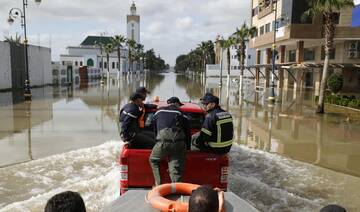ISTANBUL: Istanbul’s Hagia Sophia on Friday hosted its first Islamic prayers in 85 years, despite fierce criticism of the Turkish government’s campaign to revert the building to a mosque after being a museum for decades.
For President Recep Tayyip Erdogan, the much-publicized congregational worship represented the “conquest” of the 1,500 year-old domed monument.
Curtains hide Christian mosaics and symbols at prayer times. The head of the Turkish Directorate of Religious Affairs, Ali Erbas, gave the Friday sermon with an Ottoman sword in hand. He read verses about conquest from the Qur’an and gave a stirring, almost provocative speech about “the ones” who turned the Hagia Sophia into a museum being “damned,” an indirect reference perhaps to the founder of the Republic of Turkey, Mustafa Kemal Ataturk.
Supporters of the conversion campaign saw its successful outcome as a source of national and religious pride, while opponents were concerned about keeping modern Turkey’s secular legacy intact.
The monument is on the UNESCO World Heritage list and last year attracted 3.7 million visitors, making it one of the top tourist destinations in the country.
UNESCO as well as authorities in Washington, Moscow, Brussels and Athens expressed their concerns about Turkey’s unilateral actions.
Berk Esen, a political analyst from Ankara’s Bilkent University, said that although there had been strong objections in some quarters to the conversion, the international response had mostly been mute.
“Obviously, the decision is generally unpopular abroad but few governments took strong notice amid the continuing pandemic,” he told Arab News. “Nonetheless, converting the Hagia Sophia’s status to a mosque will be seen by many international observers as yet another move by the Erdogan government to destroy Turkey’s secular regime and its links to the West.”
There were protests in Greece on Friday against Turkey’s decision and, according to Prime Minister Kyriakos Mitsotakis, what happened at the Hagia Sophia was “not an indication of power” but a “sign of weakness.” Athens said that the latest move would burn bridges between Turkey and the West.
Esen added that Erdogan appeared to have failed to generate sympathy and support in the Muslim world.
“On Erdogan’s part, this decision was taken straight out of the populist playbook of changing the public debate and energizing one’s voter base by exploiting a cultural significant issue.”
He regarded it as a “desperate attempt” to reassert control over the public debate and cater to the Islamist base.
“When coupled with the opposition’s decision to not challenge the Hagia Sophia move, Erdogan is left with few opportunities to exploit this issue to mobilize his base and polarize public opinion,” he added. “The government’s decision does not resolve any of the major problems facing Turkey in the coming months and may turn into a Pyrrhic victory for Erdogan, who finds himself more removed from the swing and undecided voters.”
According to Ozgur Unluhisarcikli, the Ankara office director of German Marshall Fund of the United States, Erdogan’s push to turn the Hagia Sophia back into a mosque and start hosting prayers had two main goals.
“Erdogan’s first goal was leaving a strong legacy as the leader who re-Islamized Hagia Sophia which he would be remembered by right-wing conservatives for generations to come,” he told Arab News. “I believe that he has reached this goal.”
His second goal was to trigger a culture war which he could not lose and the opposition could not win.
“However, the opposition rejected being lured into such a controversy, denying Erdogan his culture war. The international impact of the decision will be limited as Turkey’s image in the West is already very negative and there is not much room for worsening,” he added.
EU-Turkey relations are already strained by Ankara’s energy exploration in disputed East Mediterranean waters. The issue of the Hagia Sophia has added to the caseload, showing Turkey’s defiance on contentious issues preoccupying the international community.
During the past few weeks, the EU’s top diplomats urged Ankara to hold off on the conversion project, but Turkey insisted it was a national sovereignty issue.
Turkey ‘re-conquers’ Hagia Sophia amid international disapproval
https://arab.news/nhhxt
Turkey ‘re-conquers’ Hagia Sophia amid international disapproval

- The monument is on the UNESCO World Heritage list and last year attracted 3.7 million visitors
- Curtains hide Christian mosaics and symbols at prayer times
Morocco’s energy ministry puts gas pipeline project on hold

- The country’s natural gas demand is expected to rise to 8 billion cubic meters in 2027 from around 1 bcm currently, according to ministry estimates
RABAT: Morocco’s energy ministry said on Monday it has paused a tender launched last month for a gas pipeline project, without giving details on the reasons for the suspension.
The tender sought bids to build a pipeline linking a future gas terminal at the Nador West Med port on the Mediterranean to an existing pipeline that allows Morocco to import LNG through Spanish terminals and supply two power plants.
It also covered a section that would connect the existing pipeline to industrial zones on the Atlantic in Mohammedia and Kenitra.
“Due to new parameters and assumptions related to this project... the ministry of energy transition and sustainable development is postponing the receipt of applications and the opening of bids received as of today,” the ministry said in a statement.
Morocco is looking to expand its use of natural gas to diversify away from coal as it also accelerates its renewable energy plan, which aims for renewables to account for 52 percent of installed capacity by 2030, up from 45 percent now.
The country’s natural gas demand is expected to rise to 8 billion cubic meters in 2027 from around 1 bcm currently, according to ministry estimates.













